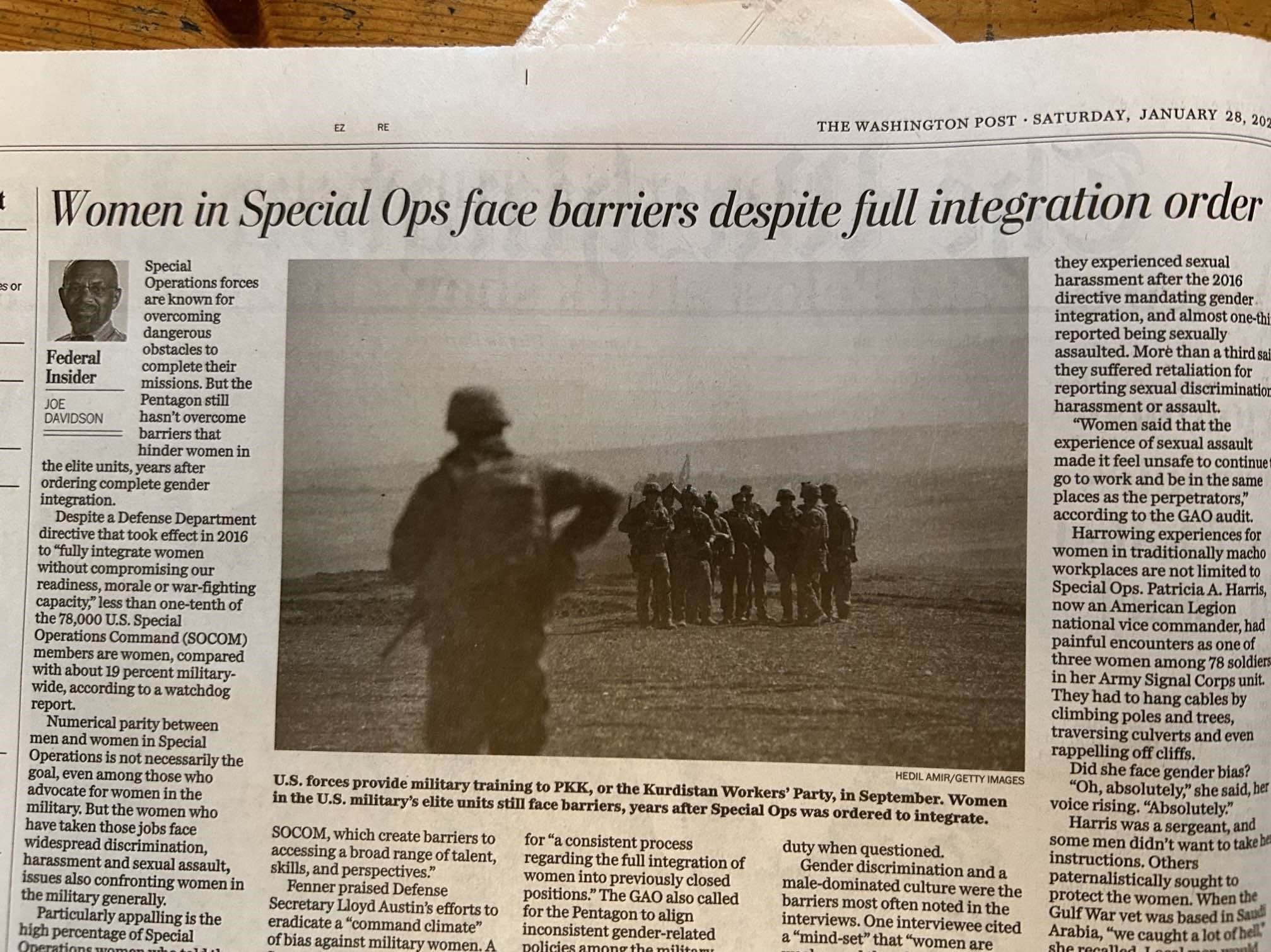© Turkuvaz Haberleşme ve Yayıncılık 2024
An article in The Washington Post, a newspaper known for its close ties to the White House, has once again exposed the military training the United States provides to the PKK terrorist organization's Syrian wing, the YPG, in Syria.
The caption of the photograph used in Joe Davidson’s article “Women in Special Ops face barriers despite full integration order” reads, “U.S. forces provide military training to PKK, or the Kurdistan Workers’ Party, in September,” fully revealing the U.S. Army’s continued support to terrorists plaguing northern Syria across Türkiye’s border.
Bruce Hoffman, an American political analyst specializing in anti-terrorism, was among the first to take note of the caption.
“Look at the caption of this photo on page 2 of today's Washington Post,” Hoffman wrote on Twitter. “Does U.S. Special Forces really ‘provide military training’ to the PKK--a group listed as a foreign terrorist organization by the U.S. State Department since 1997?”

The PKK is recognized as a terrorist organization by the U.S., Türkiye and the European Union, but Washington is insistent on not giving the same treatment to its Syrian affiliate, the YPG. The White House primarily partnered with the YPG to push back the Daesh terrorist group in northeastern Syria, and Ankara strongly opposes U.S. support for it.
The PKK/YPG have controlled much of northeastern Syria since the forces of Syrian regime leader Bashar Assad withdrew in 2012. The terrorist group poses a major threat to Türkiye and terrorizes local people, destroys their homes and forces them to flee.
Under the pretext of fighting Daesh, Washington has supplied military training and truckloads of arms to the PKK/YPG in the region. Most recently in early January, local sources reported that nearly 100 vehicles carrying military and logistical reinforcements rolled into Syria’s Hasakah region controlled by PKK/YPG terrorists.
The terrorists use bases across Türkiye’s border in the north of both Syria and Iraq to plot and carry out attacks on the country, hoping to create a terrorist corridor along the borderline.
Since 2016, Ankara has been leading counteroffensives against the terrorist groups and striving to establish a 30-kilometer-deep (19-mile-deep) security line, for which Russia and the U.S. committed to providing support in October 2019.
The same month, Türkiye launched its Operation Spring Peace against the PKK/YPG and Daesh in northern Syria, with Washington promising that the PKK/YPG would withdraw from the region. The U.S. military then evacuated all its bases in the area, prioritizing stationing near oil fields. U.S. forces are currently present in many military bases and posts across a vast region occupied by the terrorists in the Hasakah, Raqqa and Deir el-Zour districts. Washington consistently sends reinforcements to its military units in PKK/YPG-controlled oil fields, while U.S. troops conduct regular patrols with the PKK/YPG.
Washington also often criticizes Ankara for its airstrikes on the PKK/YPG, claiming Türkiye is “threatening” its operations against remaining Daesh insurgents. Ankara has consistently slammed its censure, stating that its target is only terrorists and assuring Turkish operations don’t cause any harm to civilians or the Syrian opposition movement, which it has backed since the start of the civil war.
The issue has been a major source of strain between the NATO allies. Thanks to U.S. help worth millions of dollars, the PKK/YPG has grown stronger in northeastern Syria, despite Washington’s promises to Türkiye that it would “consult and work closely” with Ankara against Daesh and the PKK.
Just last month, President Recep Tayyip Erdoğan lambasted the U.S. for “turning a blind eye” to Türkiye’s concerns over its cooperation with the PKK/YPG despite repeated complaints, saying, “We will pull ourselves by our bootstraps.”
Erdoğan has been signaling a ground operation into northern Syria and Iraq for many months now and upped his threat following a Nov. 13 terrorist attack in Istanbul that left six dead and 81 injured. U.S. Defense Secretary Lloyd Austin expressed "strong opposition” to Erdoğan’s plans of a ground offensive.
Erdoğan and other Turkish officials dismissed any warnings, stressing that Türkiye was “committed to protecting its borders and will not seek anyone’s permission.”
Defense Minister Hulusi Akar, too, declared Türkiye was “issuing the necessary warnings to allied countries to cut off all ties with terrorist groups as soon as possible.”
Ankara has long emphasized cooperation and solidarity in the fight against terrorism will contribute to regional and global peace and security.
